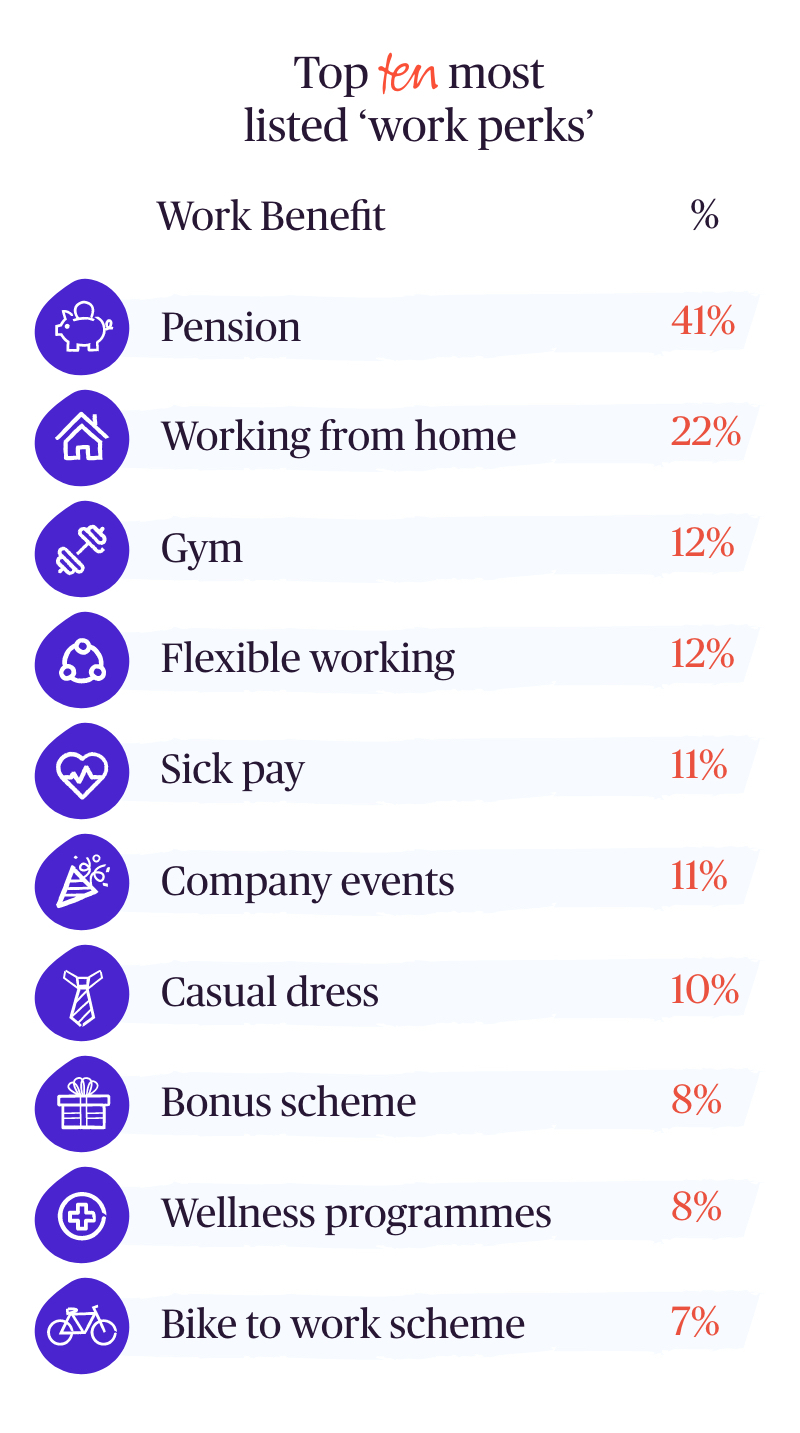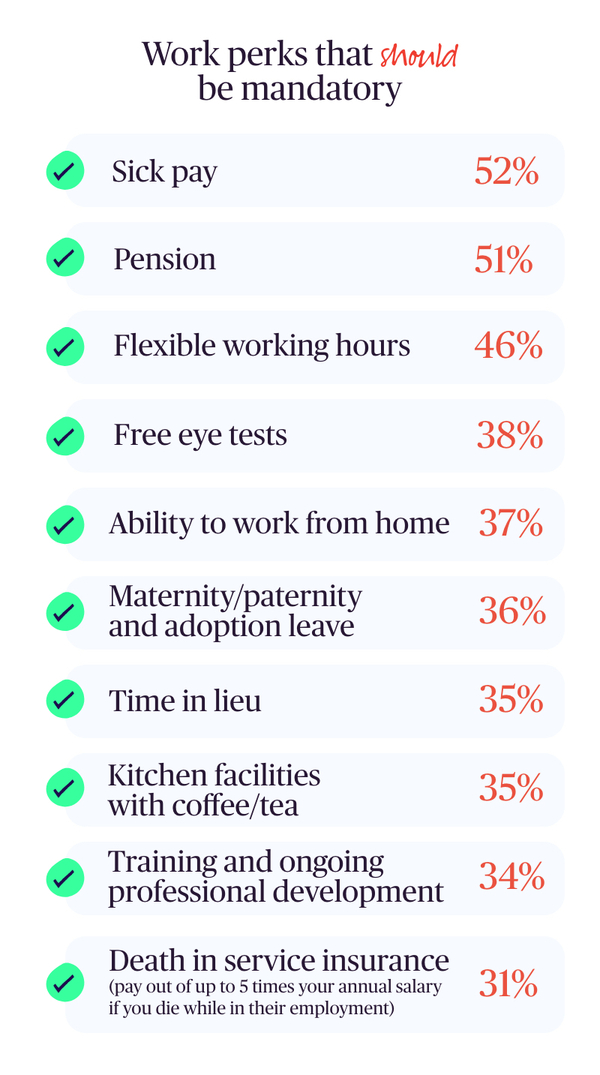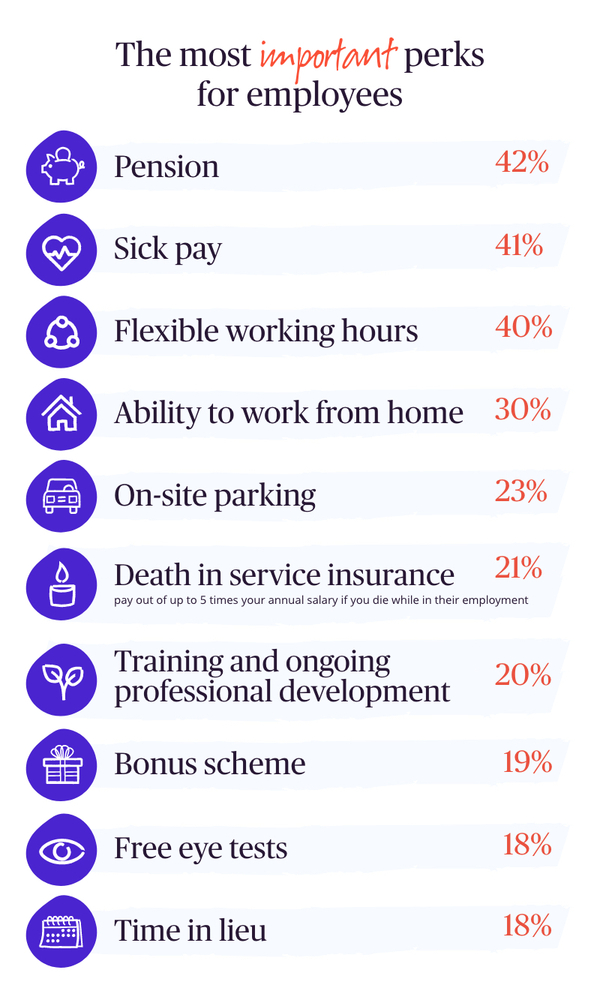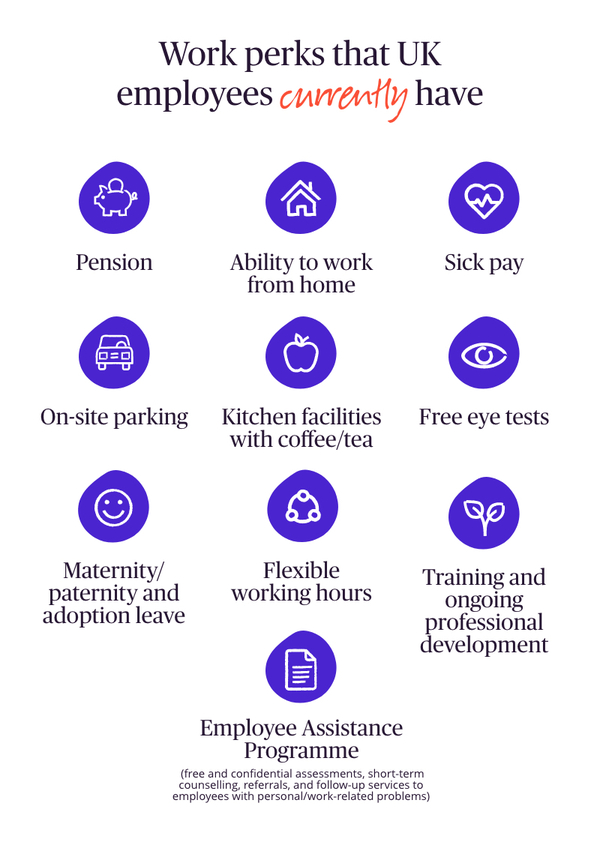
Many of us will have many different jobs throughout our lives, passing through a variety of industries and locations. But whilst our search for something to pay the bills never changes, what we expect in exchange for our time does.
Once you’ve decided to start looking for a new job, it’s not guaranteed to be an easy process. Looking for a new job can be stressful, whether it’s a complete career change, or you’re ready for new scenery in your current industry.
Sometimes, the role you want isn’t in high demand at the time, or the location isn’t a good fit. We’ve all been there, scrolling through job advertisement apps, late into the evening, hoping to find what we’re looking for.
But even if you know what you want, sometimes it’s the extra little bonuses that catch our attention, and lead us to apply.
Nowadays, a generous benefits package often leads to engaging with top talent for businesses. In fact, according to Glassdoor’s 2015 Employment Confidence Survey, about 60% of people report that benefits and perks are a major factor in considering whether to accept a job offer.
And we’re not just talking about offering the legally required benefits from businesses.
Retirement, holiday and sick pay, maternity and paternity pay, and the right to request flexible working are all necessary benefits that employers must offer to their staff.
However, many employers will list these benefits as ‘added bonuses’ on their job advertisements, leading some applicants to look elsewhere.
So what kind of ‘added extras’ are employers providing their staff, in order to attract them to the roles – and keep them happy!
We decided to analyse 1000 job roles that are being advertised on Indeed, to find out exactly which ‘benefits’ they’re offering.
As a result, we can now reveal the most commonly offered ‘work perk’ in the UK, and whether or not they are actually as ‘extensive’ as some employers claim.
We also looked into the industries that offer the most standout perks and even some of the quirkier benefits of some jobs across the country.

The number one ‘work perk’ that was listed as a benefit in job advertisements was a pension. Our analysis found that 41% of job listings offer this as a ‘benefit’ of working at their company, despite it being a legal requirement in the workplace.
The second most common benefit that employers offer job applicants was the opportunity to work from home. 22% of job advertisements we analysed listed the perk.
Throughout the pandemic, many people began adjusting to their new office environments and began working from home. It’s surprising to see that such a small percentage of job listings offering this perk to new and existing employees is an attractive offer.
Especially, as people have become accustomed to being able to choose from the busy office and their WFH set-up.
In fact, conversation surrounding working from home is turning into such a hot topic that the government may look to endorse it as a working practice.
However, despite being able to choose when you’re working being an attractive concept for most people, not many workplaces seem to be offering it, even the term ‘flexible working’ didn’t appear very often.
Our analysis revealed that flexible working was the fourth most mentioned benefit, with 11% of advertisements we looked at offering to hand over scheduling control to staff.
The third most commonly listed perk was access to a gym, as 12% of employers added this benefit to their online advertisement.
General wellbeing and fitness are hot topics after a long period of health worries due to lockdowns and restrictions. This type of benefit is also not a legal requirement, making it a potentially attractive perk for people browsing new roles.
In fact, employee’s wellbeing is clearly a high priority for employers, as wellness programs were also a popular benefit mentioned, when advertising new roles, with 8% of advertisements analysed, saying so.
Other wellbeing focused benefits listed include, healthcare (3%), annual flu jabs (0.5%), yoga sessions (0.4%), and access to free counselling services (0.2%).
Mental health awareness has led many workplaces to begin recognising ways in which they can better support their staff during difficult times.
As a result, we expected to see employers taking the initiative to go the extra mile and extend their support during mental health and emotional struggles. However, just 0.1% offered a crucial benefit of ‘child loss time off’.
The broader spectrum of mental health issues showed that just 0.8% said new employees can access a 24/7 first aid response for physical and mental ailments, and only 0.4% had a dedicated mental health support service.
Of course, employees still get sick no matter how many wellbeing perks a business offers. Sick pay was the fifth most common benefit listed in job advertisements. However, statutory sick pay is a legal requirement and allows sick staff £96.35, some companies will offer their workers their full wage whilst off work.
Other regularly mentioned benefits include casual dress (10%), bonus schemes (8%), bike to work schemes (7%) and training (6%).
However, when we began looking deeper into the data, we found that some job advertisements had really stepped outside of the box.
There were some work perks that had been listed amongst the benefits that are truly unique. Including ‘planting a tree for every new employee that’s hired’, with 0.2% adding this to their advertisements.
Some job listings mentioned beauty treatments and products being offered, as well as ice cream and burger vans on Fridays and unlimited paid holidays.
Apparently some potential employees may be on the lookout for beanbags above payslips too, as some companies are offering ‘modern and creative’ workspaces. End of the month drinks are also on the table for some businesses, in a bid to entice new workers.
But which industries are offering the most benefits, and who’s got the more interesting ones on offer for their employees?
Analysing our findings, we can reveal that the digital marketing industry is listing the highest amount of work perks. In fact, the digital marketing industry had an average of 6.5 benefits listed.
Our analysis showed that the second-best industry for benefits is the data industry, offering an average of 6.3 perks per role.
This was followed by those working in the digital editorial/journalism industry (5.1 benefits), the customer services industry (4.9 benefits), and the research industry (4.6 benefits).
We’re not surprised to see that some workplaces have got creative with the list of benefits they offer to their employees.
As new generations enter the workforce, new priorities arise. The difficulties the pandemic presented have also reshaped the working landscape for many, which may have inspired businesses to invest in these perks.
To get a better understanding, we asked 1,000 of the UK’s office workers what they expect from their employers.
Interestingly, a pension, sick pay, and flexible working hours were the top three benefits listed as both important and mandatory to UK workers.
The survey showed other perks that workers deem mandatory were: free eye tests (38%), WFH (37%), maternity and paternity leave (36%).
That’s not all though, workers also said they would expect time in lieu, and tea and coffee facilities to be provided as standard, with 35% saying so.
 But what are UK workers on the lookout for when it comes to non-mandatory perks?
But what are UK workers on the lookout for when it comes to non-mandatory perks?
42% of those surveyed said that a pension is the benefit that matters the most to them, followed by sick pay (41%) and flexible working hours (40%).
Being able to work from home was also incredibly important to those surveyed, with 30% saying it’s important to them.
Employers may wish to look into adding the following perks in their advertisement if they want to attract applicants, as they were named in the top ten perks.

So, if you’re an employer looking to boost your job listings, perhaps it would be best to add in some more interesting perks. Other perks that employees simply expect included free eye tests, WFH and coffee and tea facilities.
The survey also revealed some of the less likely perks that UK employees currently have. 4% said they have unlimited paid holidays, and 5% said they have dog friendly workspaces. A further 6% said they get their birthday off and 7% said they benefit from private dental services.
Breaking down the data highlighted that women think sick pay is more important as a mandatory benefit (59%) and a pension is more important to men (48%).
However, not all benefits are seen as the key to an enjoyable workplace. Women said that a company car is the least important to them, as 8% of women surveyed said so.
Men said that yoga sessions were of the least importance for them at work, with 8% of them saying so.
The three benefits these genders have slightly differ too, as women said they currently have a pension, sick pay and maternity/adoption leave. Meanwhile, men answered the survey and told us that they have a pension, sick pay and on-site parking.
But it’s not just gender that highlights our priorities in the workplace.
Our survey showed us that the majority of Gen Z (18-24) would prefer to have weekly drinks and beers on Friday and to travel for work, with a quarter of participants saying so.
Compared to the boomer generation (65+), in which just 2% agreed with their younger colleagues.
They would prefer to have a pension (60%), sick pay (48%) and flexible working hours (38%). These priorities are also reflected across all the other age groups, with Gen Z being the exception.
These differences are also highlighted in the benefits at work the different generations currently have. The top three perks that Gen Z respondents reported to currently have are training, child loss time off and on-site parking.
However, boomers reported to have a pension, sick pay and on-site parking as the top three benefits they currently have.
We wanted to break it down even further, so we took the data and analysed it by region.

Having a pension as a mandatory perk in the workplace was the top choice for workers in East Anglia, East Midlands, London, North West, Northern Ireland and Wales.
However, the North East, Scotland, South East, South West, West Midlands and Yorkshire and the Humber selected sick pay.
All the regions agree with each other about the perks that are the most important to them too, with all saying a pension or sick pay would be their number one benefit. However, Yorkshire and the Humber broke the mould, saying they’d prefer flexible working hours.
Despite all of these different perks that are on offer to staff, it is a matter of time before employers need to expand what’s on offer for their employees.
Perhaps in the future, we’ll see a wider variety of work life enhancing processes that could make all the difference to staff happiness and engagement.
Your own Moneypenny PA to answer calls exactly as if based in your office.
Discover >All the functions and support of an office phone system, minus the hardware.
Discover >